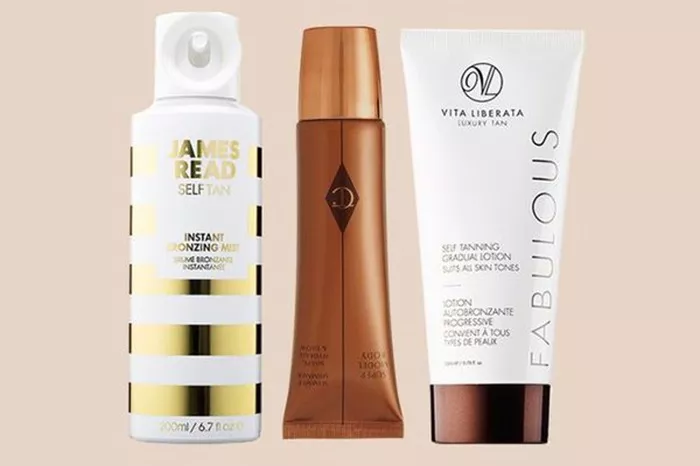Self-tanning products can be a challenge for those with sensitive skin, especially for individuals who already have a darker complexion. Many self-tanners on the market use dihydroxyacetone (DHA), a common active ingredient that can cause irritation in sensitive skin. For those looking to achieve a sun-kissed glow without compromising skin health, it’s crucial to choose the right formula. Here are some expert-approved self-tanners that cater to sensitive skin types, along with essential advice on what ingredients to avoid.
Ingredients to Avoid in Self-Tanners for Sensitive Skin
Sensitive skin requires careful consideration when selecting self-tanners. Kristin Gunn, a cosmetic injection specialist, advises avoiding self-tanners with DHA if you have sensitive skin, as it can trigger reactions. “A lot of my patients have sensitive skin, and it seems that self-tanners with DHA can cause reactions,” she explains. “It’s important to conduct a patch test before using such products on your face. Products with fragrances, preservatives, and sulfates can also increase irritation risks. Additionally, some older self-tanners contain isopropyl myristate, which can block pores and lead to acne.”
Board-certified dermatologist Dr. Mina Amin supports this advice, particularly concerning fragrances and denatured alcohol. “I recommend avoiding fragrance as it can lead to irritation and rashes,” she says. “Denatured alcohol should also be avoided as it can be very drying.”
Recommended Self-Tanners for Sensitive Skin
1.Loving Tan Deluxe Gradual Tan Nourishing Tinted Body Lotion
Price: $24 (originally $30)
Pros: Features organic ingredients suitable for sensitive skin; available in various shades.
Cons: None reported.
Key Specs: 5.07 oz.
Expert Opinion: Dr. Amin praises this product for its even application and organic ingredients, which are ideal for sensitive skin.
2.Lux Unfiltered N°32 Hydrating Gradual Self Tanning Lotion in Rosewood
Price: $36
Pros: Contains hydrating ingredients like shea butter and avocado.
Cons: Strong scent.
Key Specs: 6.8 oz.
Expert Opinion: Despite containing DHA, this self-tanner is recommended for its natural glow and hydration, though its scent may be strong for some.
3.Saltyface Essential Tanning Set
Price: $119
Pros: Includes products for both face and body; nourishes skin with organic extracts; available in two shades.
Cons: None reported.
Key Specs: 6.8 oz. body lotion, 1.8 oz. face lotion.
Expert Opinion: Gunn highlights this set for its effective and comfortable application, ideal for both sensitive and fair skin.
4.Luna Bronze Glow Gradual Tanning Moisturizer
Price: $34
Pros: Combines moisturizing and gradual tanning benefits; contains organic ingredients.
Cons: Contains essential oils, which may not suit all skin types.
Key Specs: 6.8 oz.
Expert Opinion: This moisturizer is favored for its non-irritating formula and hydration.
5.SOLEAU The Tanning Cream
Price: $36
Pros: Fragrance-free; contains high-quality natural tanning actives.
Cons: None reported.
Key Specs: 6.8 oz.
Expert Opinion: This cream is recommended for its high-quality ingredients and suitability for sensitive skin.
6.Typology Self-Tanning Serum with 10% DHA + Carob Pulp Extract
Price: $55
Pros: Provides a natural-looking tan for the face; non-streaky.
Cons: Expensive.
Key Specs: 1 oz.
Expert Opinion: Gunn endorses these drops for a sun-kissed look that is gentle on sensitive skin.
7.Coco & Eve Sunny Honey Bali Bronzing Foam
Price: $35
Pros: Available in three shades; lightweight and hydrating.
Cons: Scented, which may irritate sensitive skin.
Key Specs: 6.7 oz.
Expert Opinion: Praised for its hydrating formula and quick-drying properties, though its fragrance may not be suitable for all.
8.Bali Body Self-Tanning Mousse
Price: $30
Pros: Customizable results; contains soothing ingredients like chamomile and antioxidants; quick-drying.
Cons: Not alcohol-free.
Key Specs: 6.7 oz.
Expert Opinion: This mousse is highlighted for its soothing properties and brightening antioxidants.
For those with sensitive skin, choosing the right self-tanner involves avoiding certain irritants and opting for products with nourishing, gentle ingredients. Always perform a patch test to ensure compatibility with your skin type before full application.
Related topic:
Rising Deaths from Non-Melanoma Skin Cancer in Australia
The Truth Behind Collagen Creams: Do They Really Work?
Sun Damage: The Primary Threat to Skin Health and How to Combat It


